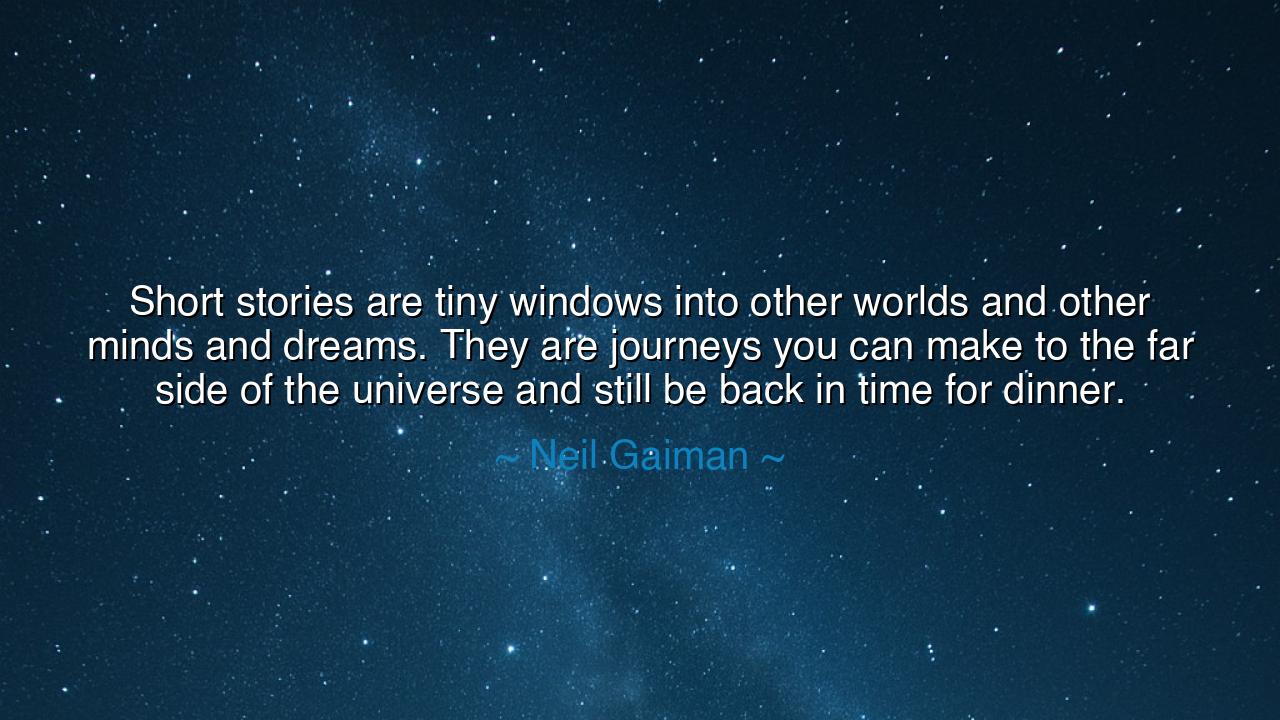
Short stories are tiny windows into other worlds and other minds
Short stories are tiny windows into other worlds and other minds and dreams. They are journeys you can make to the far side of the universe and still be back in time for dinner.






In the luminous and imaginative words of Neil Gaiman, the master storyteller of our age, we find a truth that speaks not only to the craft of writing, but to the wonder of being human: “Short stories are tiny windows into other worlds and other minds and dreams. They are journeys you can make to the far side of the universe and still be back in time for dinner.” This is no mere comment on literature; it is an ode to the boundless capacity of imagination — that sacred gift which allows mortals to walk among gods, to visit the stars, and to return home before the fire burns low.
The origin of this quote comes from Gaiman’s reflections on the magic of short fiction — the art of telling an entire world’s truth in but a few pages. As a writer of dreams, myth, and shadow, Gaiman has long known that stories are not mere words upon a page; they are portals, thresholds between the seen and the unseen. A short story, he reminds us, is like a window — small in size, yet infinite in what it reveals. It does not demand days or years of one’s life, but for a brief moment, it steals the breath and awakens the soul, granting the reader a glimpse of another life, another dream, another possibility.
To call short stories “tiny windows into other worlds” is to understand the nature of imagination itself. Every story, no matter how small, opens a door into the heart of another being. Through it, we gaze into the minds and dreams of those who live beyond our reach — strangers, heroes, lovers, and even gods. The storyteller, then, becomes a bridge between realms, much like the bards of old who carried tales from village to village, binding the hearts of their listeners through shared wonder. These “tiny windows” do not merely entertain; they remind us of our shared humanity, and of the infinite forms that truth may take.
When Gaiman says that such stories are “journeys to the far side of the universe,” he speaks to the extraordinary power of art to transport. In the turning of a few pages, one may sail across galaxies, walk the cobblestone streets of forgotten cities, or wander through the dreams of the dead. And yet, this journey demands no grand vessel, no passage of years. One may begin it with a single word and return to the ordinary world before the day is done. Such is the paradox and the miracle of storytelling — that through it, we travel vast distances without ever leaving our chair. It is the greatest journey the soul can take, one that nourishes both heart and mind.
History offers us countless testaments to this truth. Consider Edgar Allan Poe, whose brief and haunting tales changed the course of literature forever. With a few thousand words, he could summon terror, longing, or beauty so intense that entire generations would dream differently because of him. Or think of Anton Chekhov, who captured the quiet sorrow of the human condition within pages so concise they could fit in a single sitting — yet within them lived entire universes of emotion. Their works were indeed “tiny windows” through which the reader could glimpse eternity.
But Gaiman’s quote carries not only admiration — it carries wisdom. He reminds us that art need not be vast to be profound. A moment of imagination can hold the weight of a lifetime. In our hurried age, when time is scarce and attention scattered, the short story teaches us to find depth in brevity, meaning in stillness, and wonder in simplicity. Just as a single spark can light the night, so can a single story illuminate the soul. To read is to remember that one’s spirit, though bound to the body, remains forever free — capable of flight beyond stars and back again before the table is set for supper.
So, O seeker of meaning, take this lesson to heart: never underestimate the small doors of imagination. Read widely, for each tale, no matter how short, carries a fragment of truth. Write if your heart compels you, for your story, however brief, may open a window for another soul lost in darkness. Let your mind wander across the universes hidden in words, but always return home with newfound wonder for the world that birthed you. For as Gaiman teaches, every story — no matter how brief — is both a journey outward and a return inward. Through these “tiny windows,” we do not escape reality; we learn to see it anew — richer, deeper, and forever more alive.






AAdministratorAdministrator
Welcome, honored guests. Please leave a comment, we will respond soon